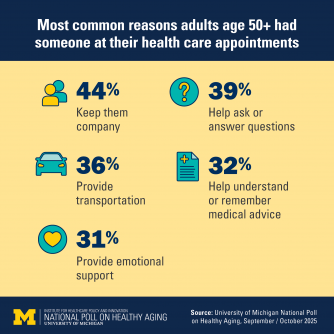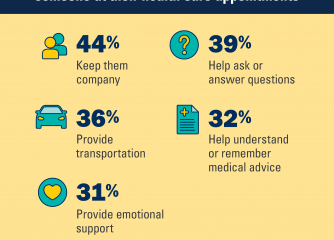Health
Health Care Companions Boost Outcomes for Older Adults, Poll Reveals

A recent survey conducted by the University of Michigan has revealed that older adults benefit significantly from having companions during health care appointments. The poll, which included responses from 2,883 adults aged 50 to 97, found that 38% of individuals in this age group had another adult accompany them to at least one health care visit in the past year. This included 4% who reported having a companion during a telehealth appointment.
The findings emphasize the importance of these “health care companions,” with 92% of respondents indicating that their presence was helpful. Those who served as companions also reported positive experiences, with 99% stating they found their role beneficial. Companions aided in asking questions, understanding medical advice, and providing emotional and logistical support.
According to the poll, which is part of the National Poll on Healthy Aging, 92% of adults over 50 had at least one health care appointment last year. This statistic suggests that there is ample opportunity for older adults to benefit from companionship during these visits, if both patients and health care providers recognize the advantages.
Importance of Health Care Companions
Dr. Jeffrey Kullgren, the poll’s director and a primary care physician at the VA Ann Arbor Healthcare System, highlighted the value of having a support person present. He stated, “My priority is to ensure that my patients use our time together well, leaving with the information and next steps they need to manage their health conditions.” He noted that having a companion can be particularly crucial for patients with cognitive issues or complex medical conditions.
Despite these benefits, the poll indicated that 62% of older adults had not chosen to bring someone with them to appointments in the past year. The reasons varied: 80% felt they did not require assistance, while 20% preferred to attend alone. Additionally, 11% expressed concerns about being a burden, and 6% cited a lack of available companions.
The results suggest that health care providers could enhance the support offered to patients by encouraging them to bring companions to both in-person and telehealth visits. Kullgren proposed that health care systems develop options for patients who may not have someone to accompany them, such as providing patient advocates or navigators.
Benefits and Demographics of Companionship
The survey revealed several advantages associated with having a health care companion. Among those who attended appointments with a companion, 83% felt more comfortable sharing health information, and 79% said it helped them follow through on their health care provider’s instructions. Furthermore, 76% reported a positive impact on the quality of care received.
Patterns emerged regarding who typically served as health care companions. The most common companions were spouses or partners, cited by 71% of respondents. Adult children were also significant, with 20% of those who brought someone to an appointment indicating it was their child. Women were less likely than men to have had someone accompany them, with 35% of women over 50 compared to 42% of men.
Individuals over 50 who reported fair or poor physical health, or had disabilities limiting their daily activities, were more likely to have a companion present. Those aged 65 and older were also more likely than younger counterparts to have someone accompany them to appointments.
The poll findings were derived from a nationally representative survey conducted online and by phone in February 2025 by NORC at the University of Chicago. The results have implications for how health care systems can better accommodate the needs of older adults, particularly those with complex health needs.
The implications of these findings suggest that fostering an environment where older adults feel comfortable bringing companions could significantly enhance their health care experiences. The data indicates an untapped resource that could improve interactions with health care systems and ultimately benefit patient outcomes.
-

 Technology4 months ago
Technology4 months agoDiscover the Top 10 Calorie Counting Apps of 2025
-

 Health2 months ago
Health2 months agoBella Hadid Shares Health Update After Treatment for Lyme Disease
-

 Health3 months ago
Health3 months agoErin Bates Shares Recovery Update Following Sepsis Complications
-

 Technology4 weeks ago
Technology4 weeks agoDiscover 2025’s Top GPUs for Exceptional 4K Gaming Performance
-

 Technology2 months ago
Technology2 months agoElectric Moto Influencer Surronster Arrested in Tijuana
-

 Technology4 months ago
Technology4 months agoDiscover How to Reverse Image Search Using ChatGPT Effortlessly
-

 Technology4 months ago
Technology4 months agoMeta Initiates $60B AI Data Center Expansion, Starting in Ohio
-

 Technology4 months ago
Technology4 months agoRecovering a Suspended TikTok Account: A Step-by-Step Guide
-

 Health4 months ago
Health4 months agoTested: Rab Firewall Mountain Jacket Survives Harsh Conditions
-

 Lifestyle4 months ago
Lifestyle4 months agoBelton Family Reunites After Daughter Survives Hill Country Floods
-

 Technology3 months ago
Technology3 months agoUncovering the Top Five Most Challenging Motorcycles to Ride
-

 Technology4 months ago
Technology4 months agoHarmonic Launches AI Chatbot App to Transform Mathematical Reasoning


















